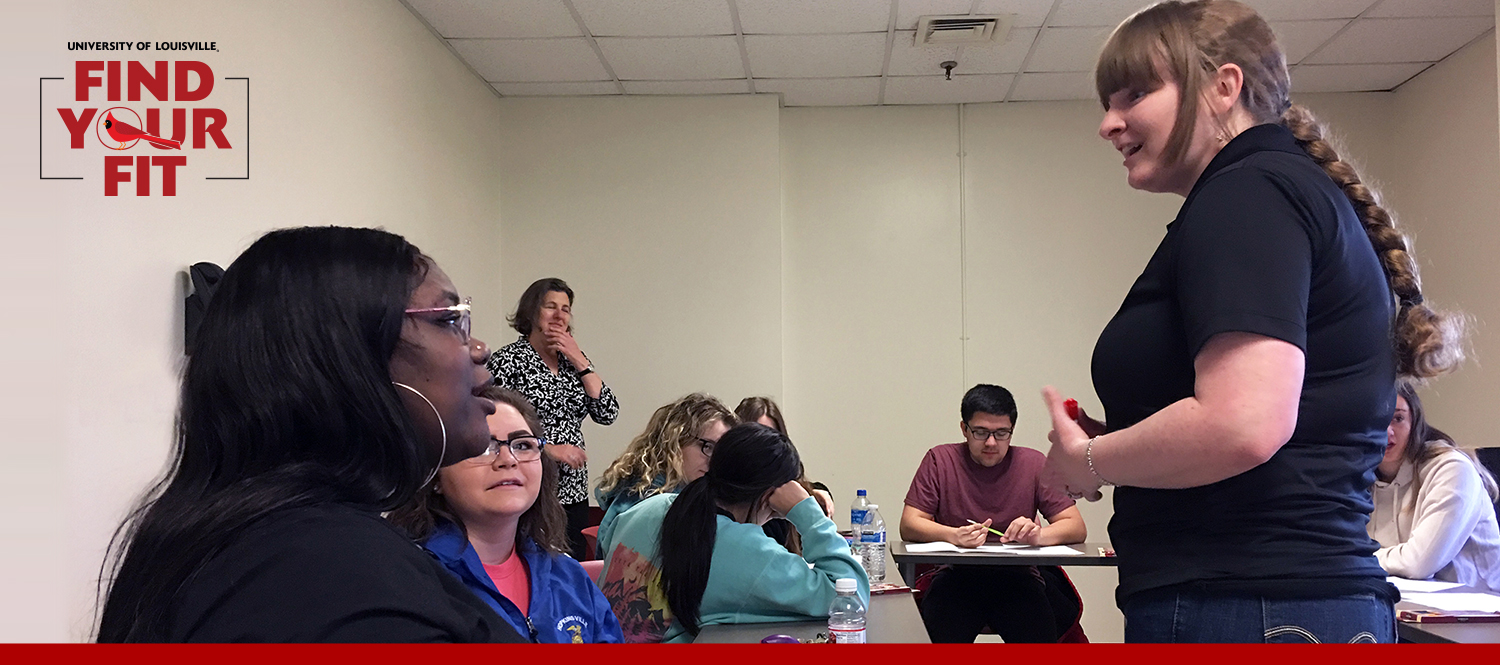
Bringing an Uncertain Future into Focus
A course offered as part of UofL’s Find Your Fit program is helping students see their future in a new light.
By the second semester of Erin Nicole Meade’s freshman year, the University of Louisville student had already switched her major twice—and still wasn't sure she was pursuing a degree in the right field.
Meade’s academic adviser suggested she consider UofL’s elective Personal and Academic Inquiry seminar, designed to help undecided second-year students identify their strengths and academic goals. Hopeful that it might point her in the direction of a potential career path, Meade decided to take the course during the fall semester of her sophomore year.
I was consumed about which direction I needed to go in,
she said. I was looking forward to getting time out of my week to sit down with people who could help me figure out what would be best for me. I went in hoping to move closer toward that goal.
The seminar, first offered in spring 2018, is the central component of UofL’s Find Your Fit (FYF) program, an initiative launched in 2017 to address the specific needs of those undergraduates deemed exploratory
(exploratory
designation is for students who are undecided on a major and for students who are pre-unit,
meaning they are not yet academically eligible for the school or college of their choice), or those who are seeking to transition out of a major and struggling to find a good fit. FYF is the university’s Quality Enhancement Plan (QEP), an experimental five-year initiative focused on improving student success that the Southern Association of Colleges and Schools Commission on Colleges (SACSCOC) requires all higher education institutions to develop as part of their reaccreditation process.
Students who participate in the FYF Personal and Academic Inquiry course meet for an hour and 15 minutes twice a week to make progress on academic inquiry projects that originate from the academic theme of each section. Alongside these projects, students work closely with the designated advisor to engage with, and interpret, personal assessments, such as the StrengthsFinder inventory, and participate in an array of self-exploration exercises and activities.
The COVID-19 pandemic has underscored the relevance of the Find Your Fit seminar. Some students are feeling uncertain about their major or career plans in this new landscape of the pandemic. Despite the changing environment, the team of campus instructors in the FYF program continue to support students in both virtual and face-to-face environments.
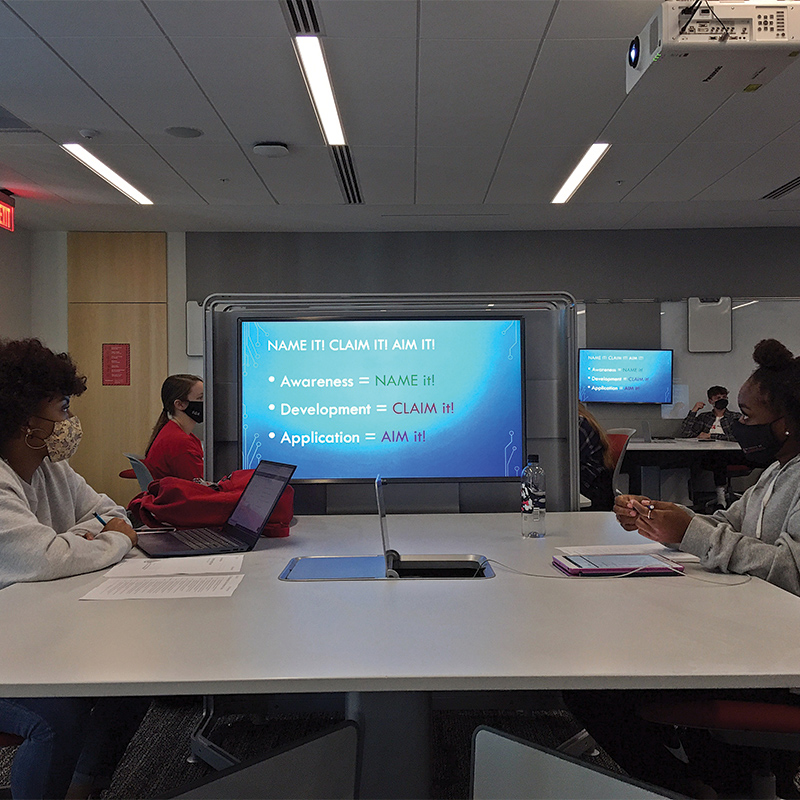
Instructor Teams Offer Different Perspectives
The seminar has an instructional team comprised of a UofL faculty member who chooses the seminar theme and leads the academic inquiry process, an exploratory and transition advisor who guides the personal inquiry process, and a librarian who supports students in finding and using their resources. Students use the library databases and other online and human-expert resources to explore their inquiry questions and look into potential major and career options with ongoing support from the instructional team.
Each instructional team provides a good mix of perspectives, according to Kimcherie Lloyd, professor and School of Music director of orchestral studies, opera theater, and undergraduate studies.
Lloyd uses music in class to initiate discussions and pique students’ interest in learning more about various topics.
Music has nothing to do with what their career choices should or might be. It’s just something to start a conversation about their interests,
she shared. It’s immediately easier to have a discussion because everybody has likes and dislikes and opinions. The class uses music as a vehicle to help them develop questions and start on research.
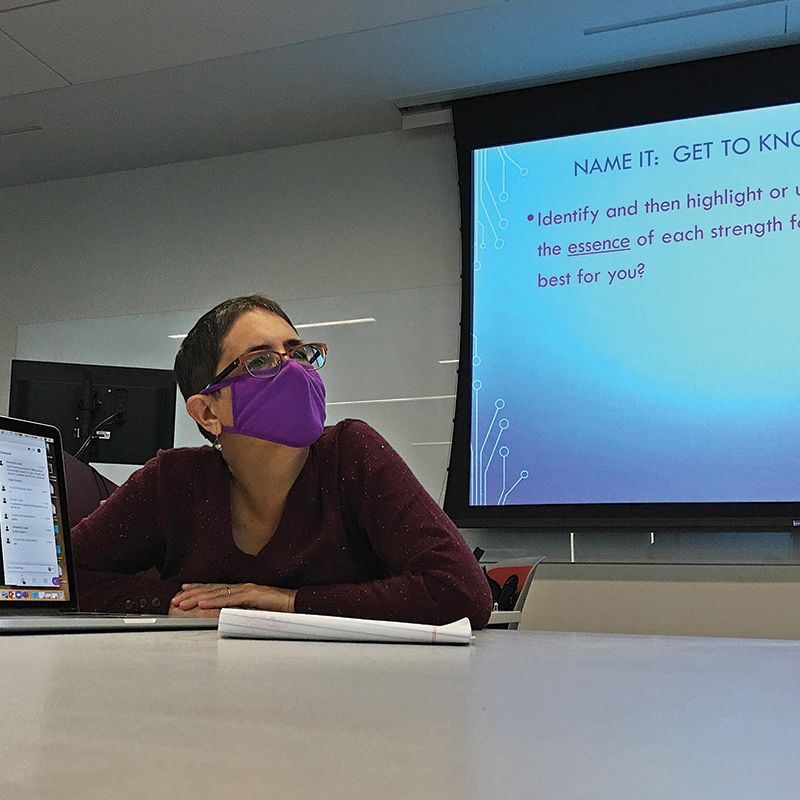
Robert Detmering, professor and information literacy coordinator at the University of Louisville Libraries, currently serves as a member of one of the instructional teams.
The intent is to help exploratory students who are maybe having trouble finding out where they’re situated in the university, in terms of a major, but also in terms of the community and relationships they have on campus,
Detmering said. Find Your Fit is designed to help students think through where they’re at in life, what their goals are, and help them go through a research process that’s personally meaningful to them.
Tracking down answers to questions raised in class can help students grow comfortable with the research process.
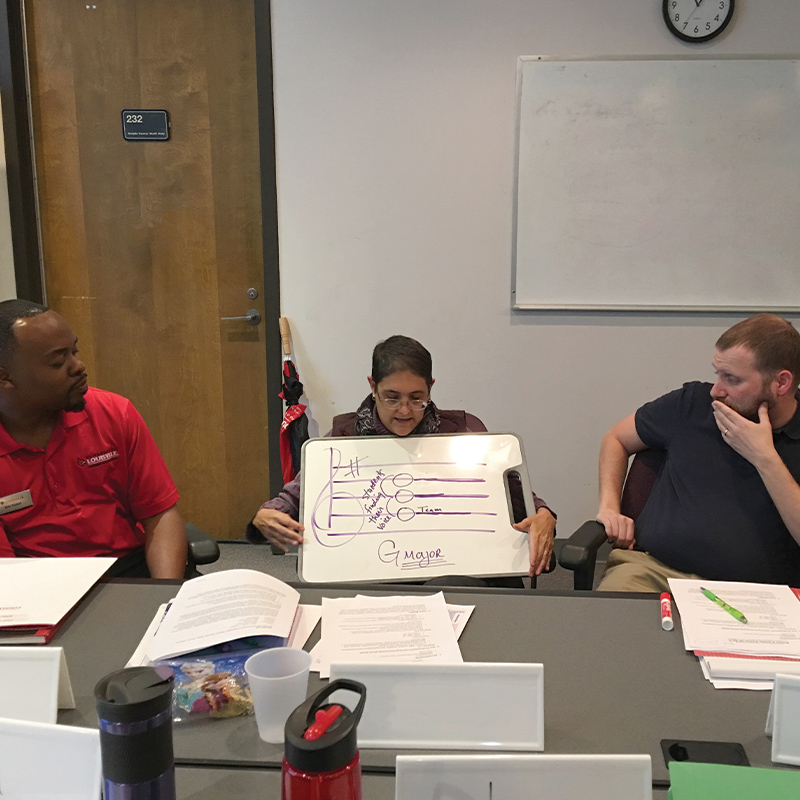
Sometimes people feel uncomfortable asking questions or feel like they should know how library research operates and maybe aren’t sure how to go about getting help,
Detmering said. In a class like this, we’re able to work closely with students and show them resources that exist and how to use them.
Individual class specifics can vary, but generally, the structure involves group dialogue and techniques such as modeling, where instructors explain an activity and show students an example of how it’s done.
We don't do a lot of standing up and lecturing,
shared Eric Turner, UofL academic counselor, exploratory and transition advising. We usually want students to lead the class with discussions. For the most part, it’s a lot of getting to know each other and sharing work with each other.
For Meade, the experience was transformative. An in-class exercise matching students’ values to corresponding jobs suggested clinical psychology might be a potential option for her. Later reading about a storytelling-based method of therapy during a class research project inspired Meade to create an individualized major involving psychology, creative writing, and women and gender studies.
I just understood at that point what my strengths were and what that could do—what I wanted to do,
she says. I really enjoy creative writing. English is something that’s my strong suit, and mental health has been something I’ve been passionate about. I couldn't for the life of me figure out how to combine those things [before the class].
Meade is now on track to graduate a semester early and plans to go to graduate school to become a clinical psychologist, with the ultimate goal of offering writing-based therapeutic services.
I figured out I needed to take [a certain number of] psychology classes, and so many creative writing classes,
she says. With that, I can graduate early and put the money I would’ve spent on my last semester of school toward grad school.
Students’ Career Conundrum
Meade’s experience, according to UofL Academic Counselor Jessica Newton, who also serves as an advisor on one of the seminar instructional teams, isn’t entirely uncommon.
As students enter their sophomore year, some students are running out of General Education courses to take, or have exhausted their electives and have not decided on or achieved clarity about a suitable academic major. Tuition costs, mounting student loans, and other elements may cause students to feel pressured to make a choice.
More people are entering college not being committed to a major,
Newton shared. The first year is an adjustment. The second year, you’re getting serious—[thinking] what is the end goal here?
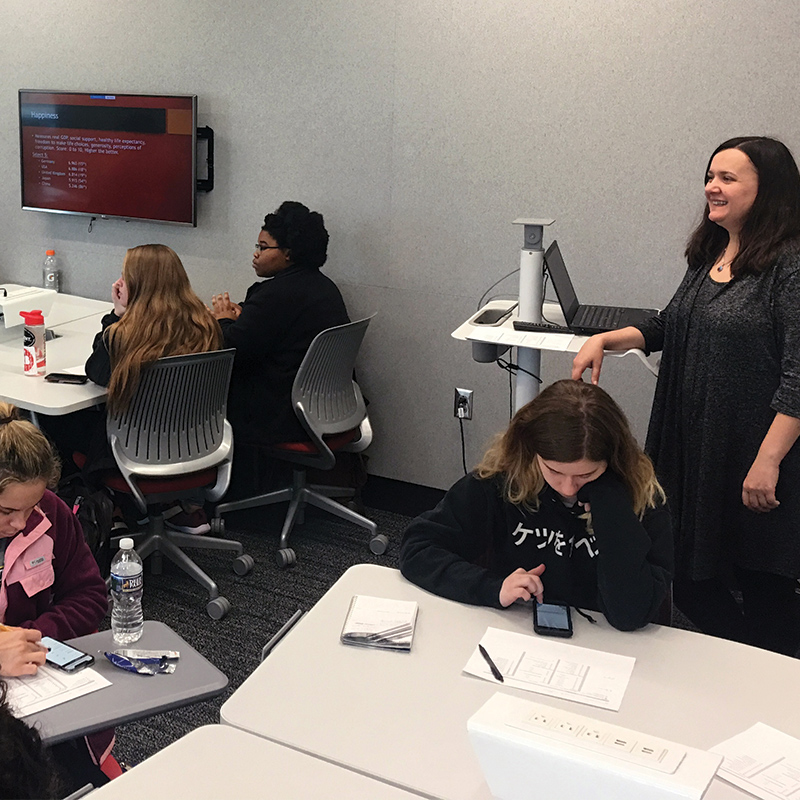
For students whose time is already tapped out by attending class, studying, working, and taking care of other responsibilities, the thought of exploring what they might want to do long term can feel overwhelming, according to Lidiya Grote, social sciences teaching and faculty outreach librarian, and member of a seminar instructional team.
Some students are struggling economically and working, others are just not sure what to study,
Grote said. Either they did not get into the program they wanted, or just realized what they initially wanted is not what they really want to do—but they don't know what else to choose. Exploring their options helps them.
Like Meade, sophomore Jack Tompkins had also changed his mind about his major after a macroeconomics class made him question whether business would be a good fit for him. He was debating taking English classes, pursuing a legal career, or trying to find something else when he decided to sign up for the FYF course last year. The experience, he says, exceeded his expectations.
I was going into the class looking for ways to figure out what skills I had that I could act upon,
Tompkins said. That’s what the class really showed me. It also showed me how to use the campus and the library, and to lean on the resources the school has available, which I wasn't doing at all before the class.
Tompkins also found comfort in the fact that other participants were in a similar situation with undeclared majors, or just unsure of what step to take next.
There were things other people in class weren’t getting out of college, whether it was socially or academically. We all bonded over that,
he said. People in my group talked about how this course made us feel a whole lot more confident about our current situation. At first at school, I felt so confused, like I didn’t know where I was going and everyone else did. It’s not really a big deal, as long as you’re on a path and are motivated and being responsible.
By the end of the course, instructors have found that a number of students are able to identify a few potential career choices, which Newton views as a success.
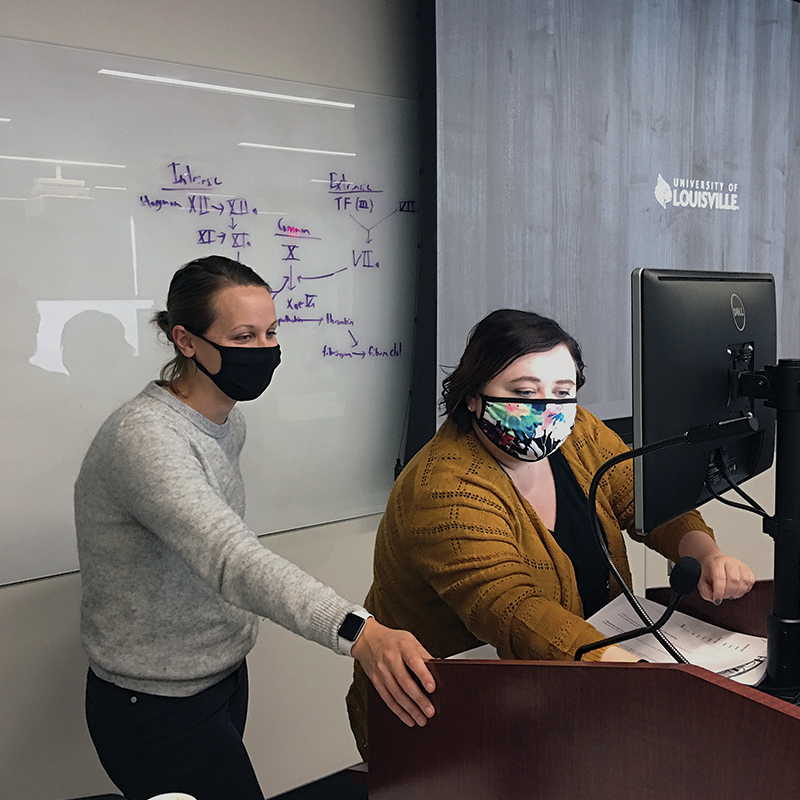
Everybody is at a different place,
she said. Some have found a path and have a better idea where they’re going, while some are still unsure and are working on it. My goal is just for them to come away from the course at least knowing what resources are available. Really, my entire role is to facilitate the decision-making process. That starts with getting to know yourself really well and examining your values and strengths.
The University Career Center also plays a key role in the Find Your Fit program. Rosie Shannon, assistant director of the center, meets with students in the classroom to facilitate activities that boost students’ awareness of potential vocational matches for their strengths and interests, and ensures that students are aware of the resources and programs available to them at the center. She also organizes a popular course feature, the Alumni Career Panel, where recent alumni visit a class session and share their personal journeys of choosing a major and finding their way into careers that makes the most of their strengths.
The goal of the Alumni Career Panel is to expose students to the world of work, and to see the connection between one’s educational path and one’s career journey,
explains Shannon. Recent alumni help students learn about the importance of networking, campus and community involvement, and how the impact of these experiences influence one’s career journey. New graduates are able to relate, connect and share with the FYF students on a personal level.
Outside of Academia
In addition to academic and career assistance, the class provides life skills drawn from the academic theme of their respective seminar, says Scott LaJoie, an associate professor in the Department of Health Promotion and Behavioral Sciences who taught a FYF seminar on positive psychology. In his course, students learned how to reframe stress as a motivator instead of something inherently negative.
One of the things they do is called a What Went Well Journal. Every day, they write down three things that went well,
LaJoie said. It could go from something minor, like a good cup of coffee, to things like their sister had a baby that’s happy and healthy. This helps the students reflect on some of the positive things that happen every day and the steps they took to making that happen.
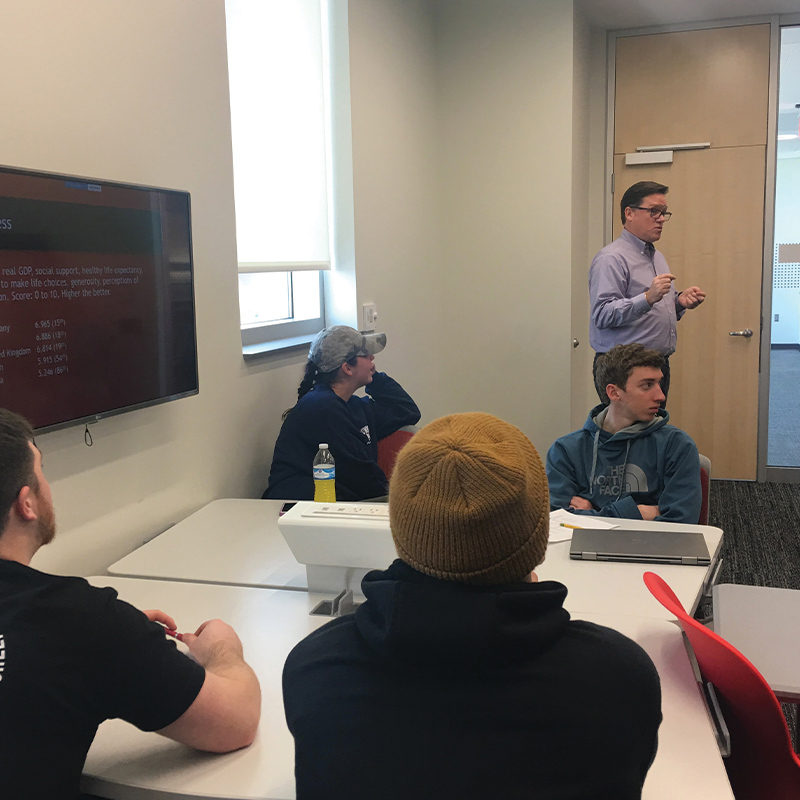
Students who are struggling with depression, personal or family issues, working full time or night shifts, and facing other demanding situations may particularly benefit from clarifying personal strengths and learning positive things about themselves, according to Grote.
We recognize there are social, economic, and other things that neither party can solve in this class. But, there are a lot of things that are in students’ control that they can do to take care of themselves emotionally, physically, professionally, and academically,
she said.
The benefits of this course don’t just extend to the students—several of the instructors feel like they’ve benefited from being involved with this seminar.
It’s given me a better appreciation of the challenges our undergraduate students face, especially when they’re having to work full-time jobs to pay for their tuition,
LaJoie said.
Turner credits the program with helping to enhance his advising capabilities.
One thing I’ve definitely been able to do is become more informed about some of the processes for those types of majors and different career opportunities that are available,
he shared. I’ve been able to refer students to different services because I’ve learned from those professors, and I’ve learned different techniques from watching them teach.
Participation in the class has also grown. The pilot program took place over two semesters with 57 total students participating across four sessions. In the three subsequent academic semesters, a total of 158 students participated across nine sessions.
The FYF program has a robust assessment structure that allows the leaders of this initiative to gauge the impact of this course on the students’ learning and their persistence to graduation. Data collected from the past four semesters of the program indicate that students are strengthening their “decidedness” around their majors and careers, and are persisting at a higher rate than similar students who did not take this innovative seminar.
Forging Ahead
Months after he completed the course, Tompkins still speaks with Turner about the five-year plan he’s created—which involves working to re-enter business school to focus on the financial side of the industry.
This course provided a place where we could turn to somebody and ask questions, and get a better perception of reality in the workforce,
Tompkins shared. Having the instructors available renews your faith in campus. There are a lot of times in college where people feel alone, and like it’s all on them. This class really showed if you want help, there are people to go to.
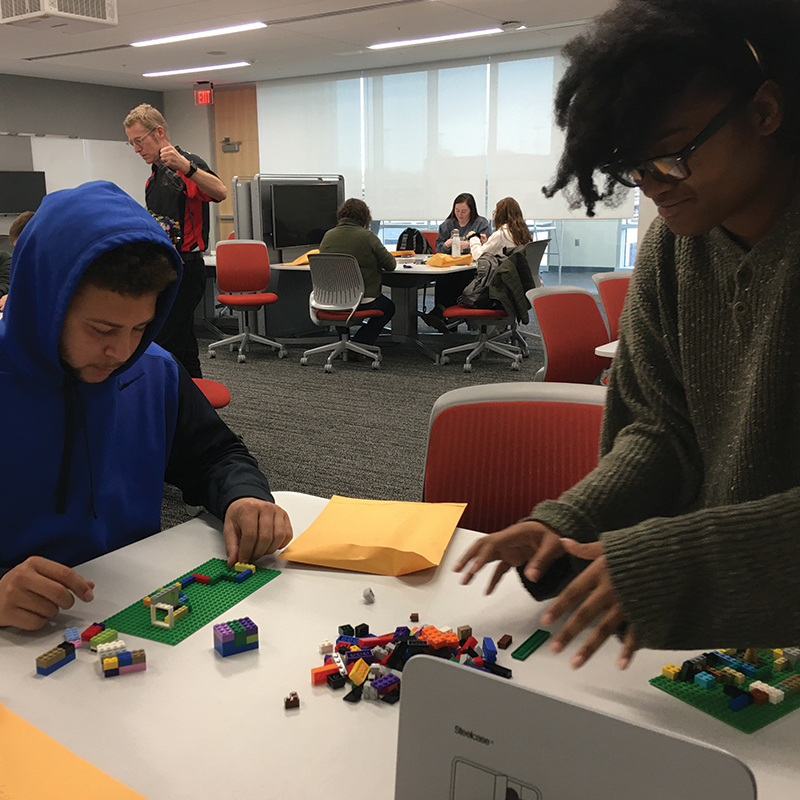
For some students, understanding that other possibilities exist—aside from the traditional career roles they may think they need to focus on—can literally be a life-altering experience, according to Lloyd.
Every freshman should have a seminar of this sort. We want them to be curious, inquisitive, ask questions, and search for answers,
she says. It’s not a crime to not know what you want to do. College used to be about figuring that out. Students get stuck trying to study the things they think would be the right things—they need to study what’s interesting to them. The moment they realize that, there’s no holding them back.
The Find Your Fit QEP initiative is an opportunity to foster a campus-wide conversation about student learning and success in the crucial second year of undergraduate studies. The program seeks to help students "find their fit" academically and align their goals with a career path. At UofL, we are committed to student success even after graduation.
For more information, visit: louisville.edu/findyourfit.

